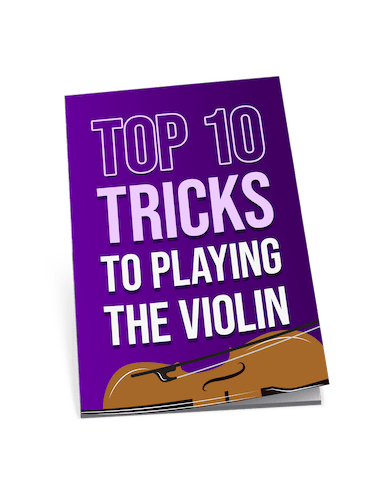Best
AFFORDABLE
ROSIN
KAPLAN THE BEST ROSIN ON
THE MARKET
-
Overall: The Original Low-Dust Recipe Handed
Down From Ladislav Kaplan -
Best Feature: Premium Case That Is Designed
For One-Handed Use -
TedScore™: 10/10
Best
OVERALL
ROSIN
PREMIUM
VIOLIN ROSIN Optimal Control for Critical Performances!
-
Overall: Crafted from a colophony of natural oils using an artisanal hand-mixing, hand-pouring process
-
Best Feature: Appropriate for all weather and climates
-
TedScore™: 9/10
Best
BUNDLE ROSIN
-
Overall: Infused with WW-grade Brazilian resins and British beeswax
-
Best Feature: Crafted using Hidersine's acclaimed hand-mixing and hand-pouring artisanal process
-
TedScore™: 9/10
When you pick up your violin bow and draw it across your violin strings, the sound that resonates is a beautiful symphony that can touch a listener’s soul.
But have you ever wondered what role rosin plays in the quality of that music to your ears? Does violin rosin make a difference?
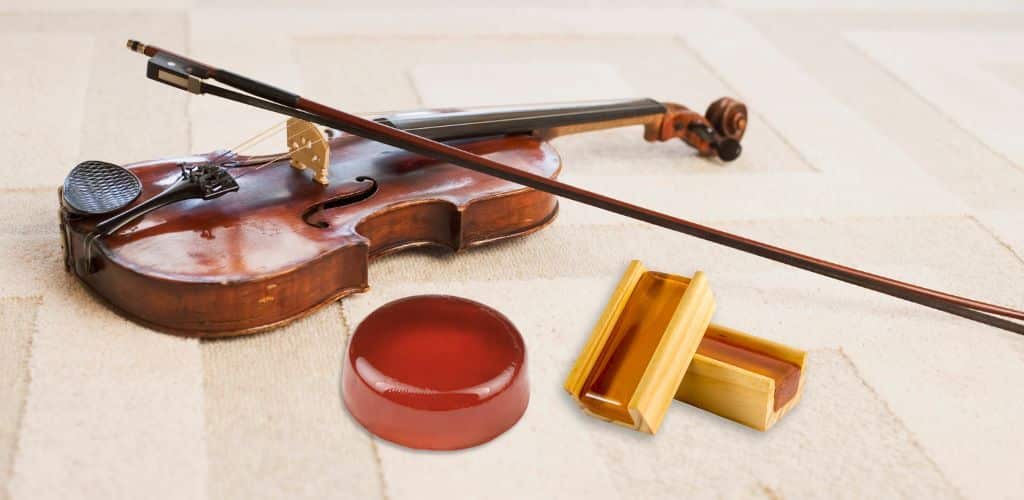
Rosin, that small, often amber-colored cake, is more than just a tool; it’s a crucial element in sound production.
Applying rosin creates friction between the bow and the strings, allowing your violin to sing with a full, rich tone that captivates and enchants.
However, there are different types of rosin, and it is very important to know the right one for your violin bows and strings.
Multiple rosins are on the market, including lighter and darker rosins, boxed rosins, and even a hypoallergenic rosin!
Choosing one can be daunting. But this is exactly why I’ve written this article – so stress not!
Understanding Rosin and Its Role in Violin Sound
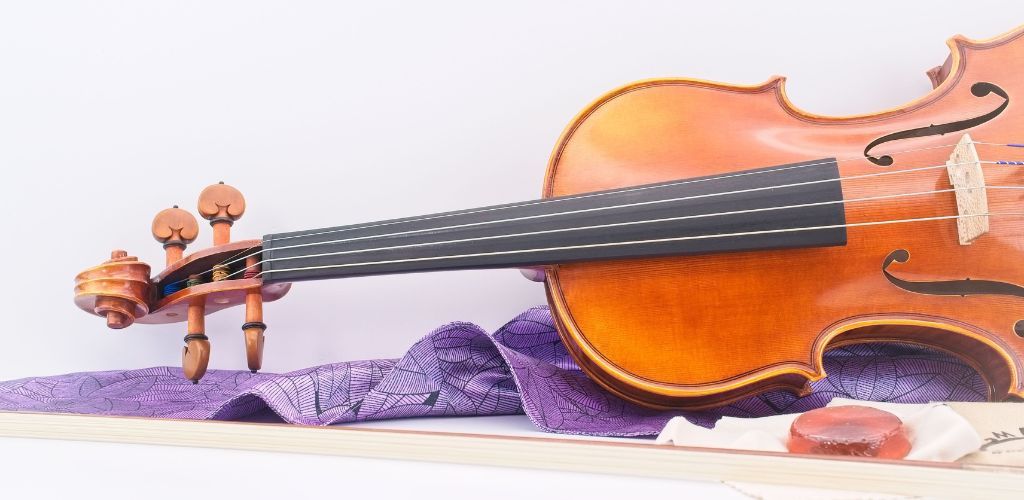
Rosin is like a hero behind the scenes who brings your violin’s voice to life!
It’s the secret ingredient in making the bow hair grip the strings just right, transforming every stroke into a note that sings.
Whether you’re a beginner learning the violin or a musician curious about the rosin’s purpose, enjoy reading!
Types and Characteristics of Rosin
When you dive into the world of rosin, you’ll find it’s quite diverse.
Light rosins are typically harder and less sticky, ideal for warmer climes.
Dark rosins are softer and stickier, preferring the company of cooler weather.
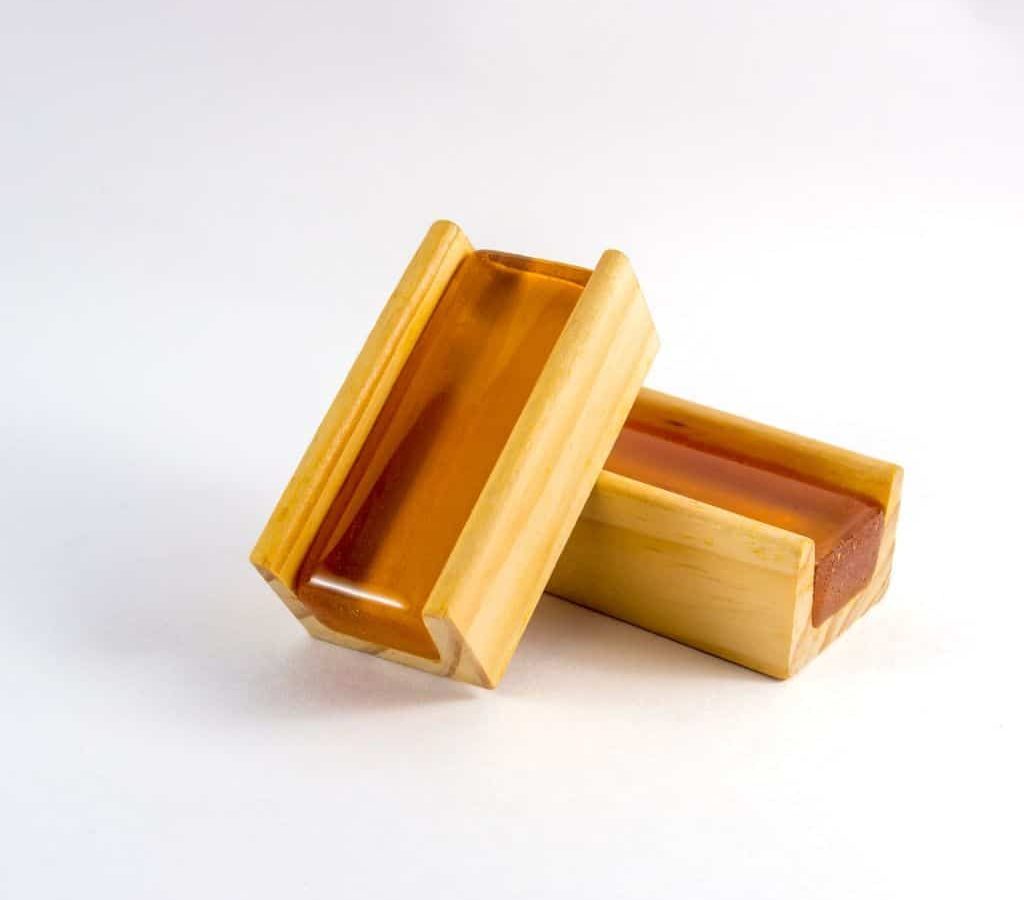
Why does this matter?
The level of stickiness affects the friction between the bow and violin strings, shaping the sound you produce!
Rosins also come in various colors and textures, each with a unique playing characteristic and personality. I’m glad there aren’t moody rosins! HAHA.
You’ve got options ranging from firm amber jewels that respond beautifully to your bow’s touch to softer, almost chocolatey varieties that give a lush, full-bodied tone.
The color, ranging from pale yellows and deep blacks to gold rosin, often suggests its grip strength and resultant sound quality.
Rosin Materials and their Impact
Your rosin formulations start with tree resin, usually from pine trees—nature’s own sticky treasure.
This sap is cooked down to create the rosin that gives your bow hairs its power.
Some rosin formulas get a little extra sparkle with precious metals like gold, silver, or copper to enhance their grip or to produce a warmer tone.
Not all rosins are pure tree sap, though. A modern twist with newer rosins from a synthetic core offers a different experience.
Whether natural or synthetic, the density and stickiness of the rosin will determine how much control you have over your violin’s tone.
A harder rosin gives you a clear, bright sound.
A softer rosin tends to bring out a warmer, richer tone.

Rosin Selection for Different Climates
Your choice of rosin can change with the weather—literally!
Humid climates need a harder, less sticky rosin as moisture in the air already adds a certain grip.
In dry climates, a softer rosin can compensate for the lack of humidity and provide the necessary adherence without too much pressure.
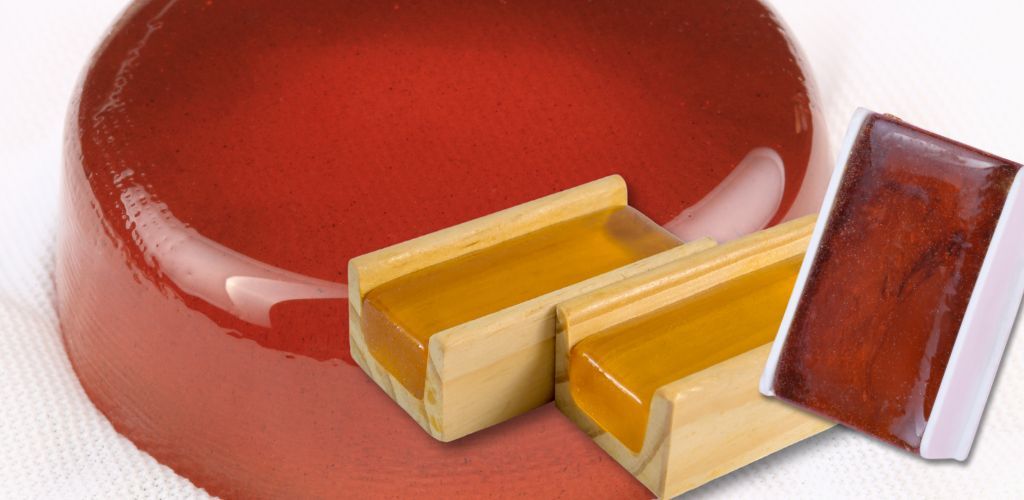
Dry climates: Warmer, softer rosins that won’t let you slide off key.
Humid climates: Go for a harder, less clingy rosin to keep your sound crisp and clear.
Rosin Usage and Maintenance Tips
Applying your new rosin to your violin bow and strings is not as simple as a swipe-and-go. Let’s make sure you’re getting the most out of your rosin with some clever tips.
Proper Application of Rosin
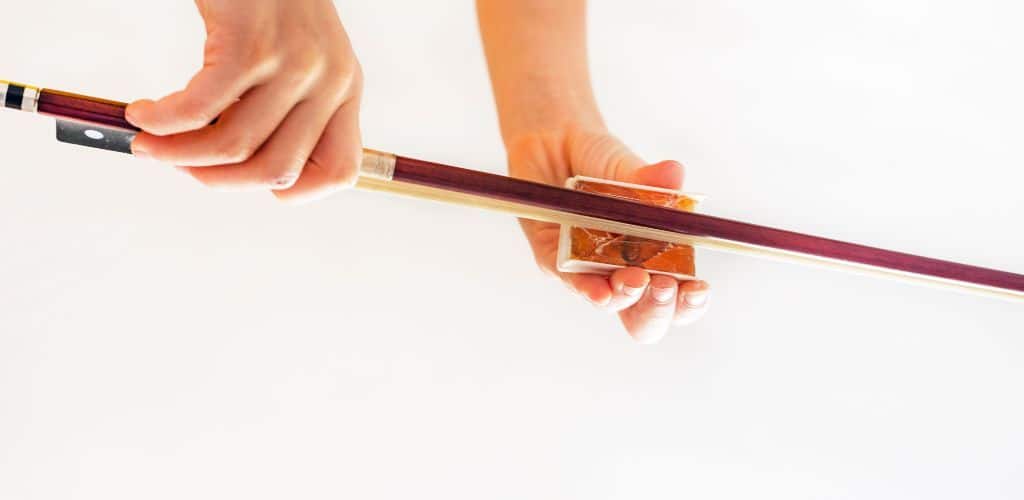
Imagine your bow hair and rosin working together in a beautiful duet.
To join forces, glide your bow smoothly across the rosin cake. Just a few swipes from frog to tip will keep the music flowing.
But don’t overdo it!
Too much rosin will make your bow a flaky mess because of rosin buildup; too little, and your bow might slip away notes.
Maintaining and Storing Your Rosin
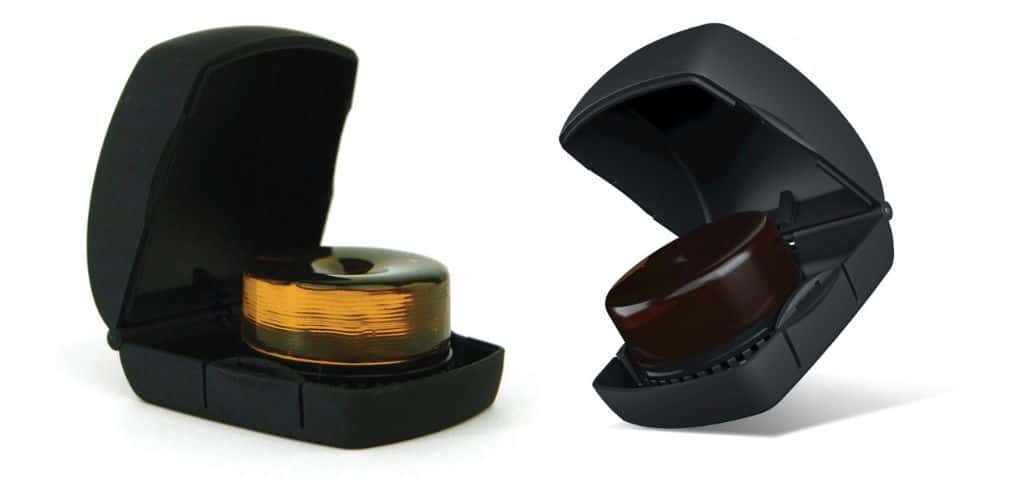
Like a good cheese, rosin has a shelf life and thrives in the right environment.
Keep your rosin cake in its protective container—think of it as a cozy little home free from the clutches of heat or cold.
And watch out for dust and grime! You don’t want them sticking around anywhere near your rosin.
Choosing Rosin for Different Violin Styles
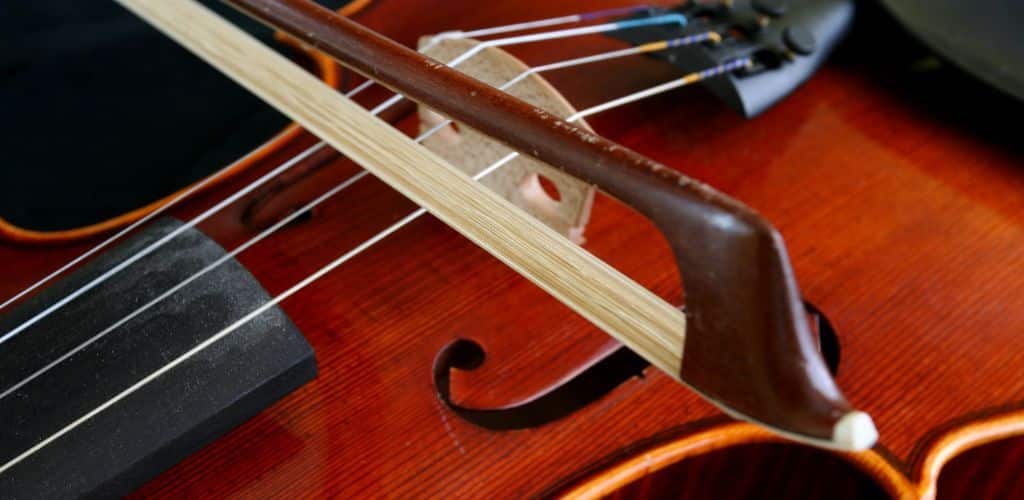
Your violin playing style is like your fingerprint—utterly unique.
Luckily, there’s a rosin to match, from beginner blends to professional-grade magic.
Lighter rosins are usually the pick for those detailed classical pieces, while a darker, stickier rosin might suit your vigorous folk tunes.
Rosins I Love Using!
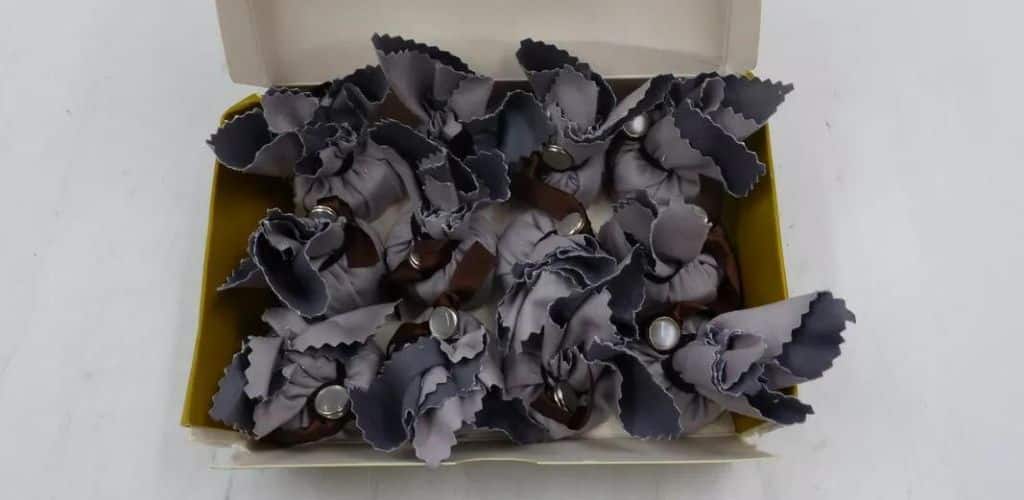
As a violinist, I’ve been using the W.E. Hill & Sons Premium Violin Rosin because it offers exceptional grip and a smooth playing experience, enhancing the clarity and richness of my violin’s sound.
Its formulation, consistency, and minimal dust production make it a top choice for my string performances and practice sessions.
W.E. Hill & Sons Premium Violin Rosin
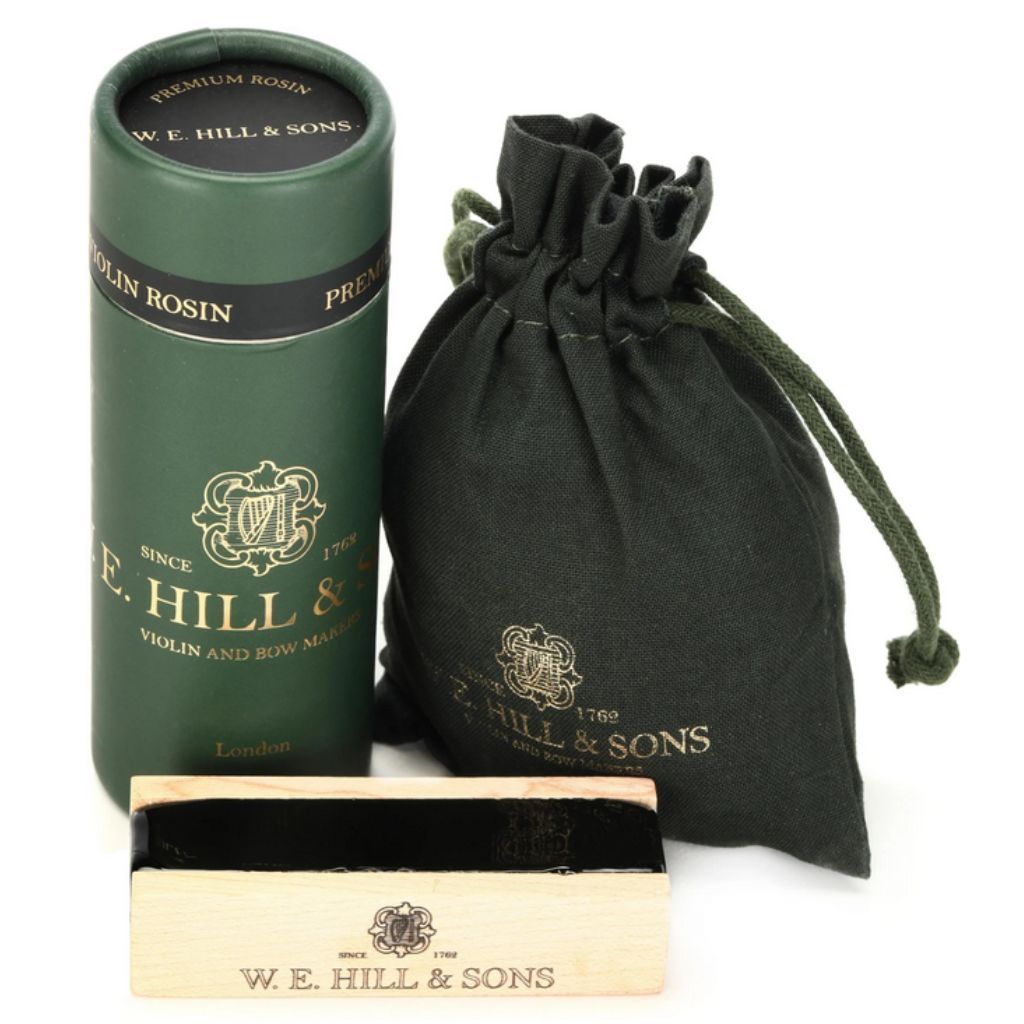
FEATURES: Crafted from a colophony of natural oils using an artisanal hand-mixing, hand-pouring process
OTHER INFO: Appropriate for all weather and climates
- Provides lock-tight bow-hand control
- Comes encased in a solid Maplewood holder with a color-matched drawstring bag and a display tube
- Expensive compared to other rosins
When you click ‘Check Price’, you’ll see there are loads of great places to buy this item. Our personal favorite is Sweetwater for the US, and Thomann and Gear4Music for the UK & Europe.
They are the largest music retailers, with excellent customer service, competitive prices, really fast shipping, and the longest guarantees.
The professional musician who wrote this article combined many things,
from the product build, manufacturer’s reputation through to feedback
from other users, to create our famous TedScore™.
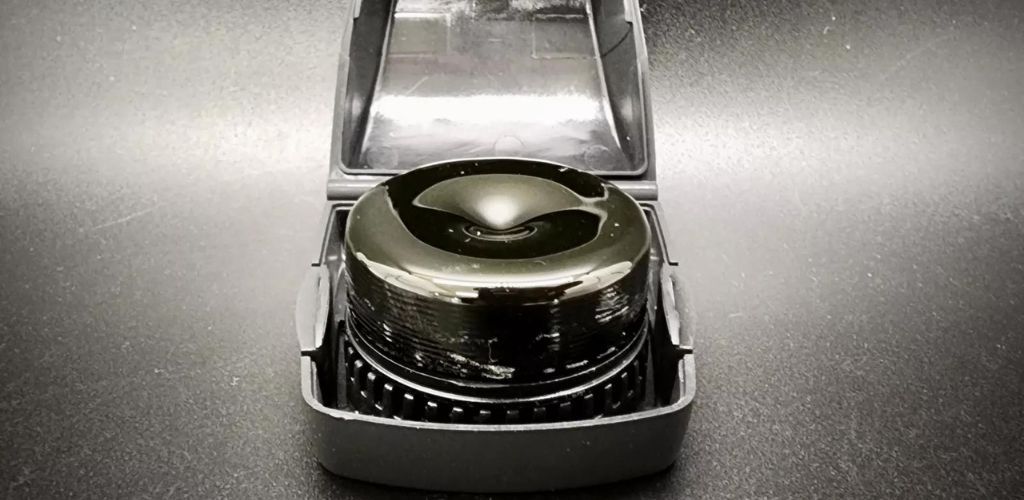
The D’Addario Kaplan Premium Rosin has greatly impressed me with its low rosin dust formula and the ease with which it allows my bow to glide across the strings, providing a clean, articulate sound.
Its practical and elegant packaging makes it a convenient and reliable choice for my violin solo-playing needs.
D'Addario Kaplan
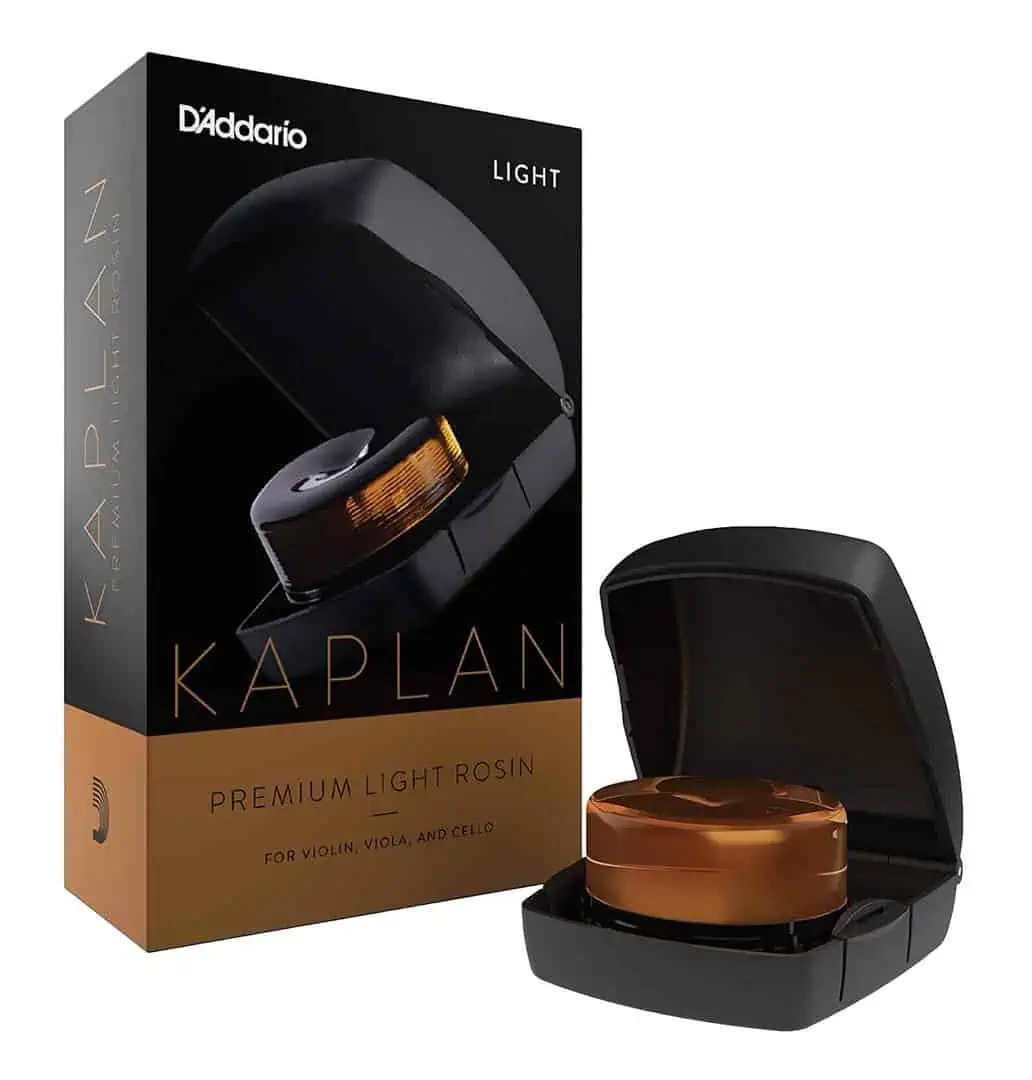
COMES WITH: Premium case that is designed for one-handed use
FEATURES: The original low-dust recipe handed down from Ladislav Kaplan
D'Addario Kaplan
- Amazing Case
- Low Dust
- A Pleasure To Use
- None!
When you click ‘Check Price’, you’ll see there are loads of great places to buy this item. Our personal favorite is Sweetwater for the US, and Thomann and Gear4Music for the UK & Europe.
They are the largest music retailers, with excellent customer service, competitive prices, really fast shipping, and the longest guarantees.
The professional musician who wrote this article combined many things,
from the product build, manufacturer’s reputation through to feedback
from other users, to create our famous TedScore™.
I’ve been delighted by the Hidersine Reserve21 Violin Rosin with British Beeswax for its smooth application and the warm, full-bodied tone it brings out of my violin.
The British beeswax substance adds a unique character to the rosin and contributes to a noticeably grippy yet refined sound.
Hidersine Reserve21 Violin Rosin with British Beeswax
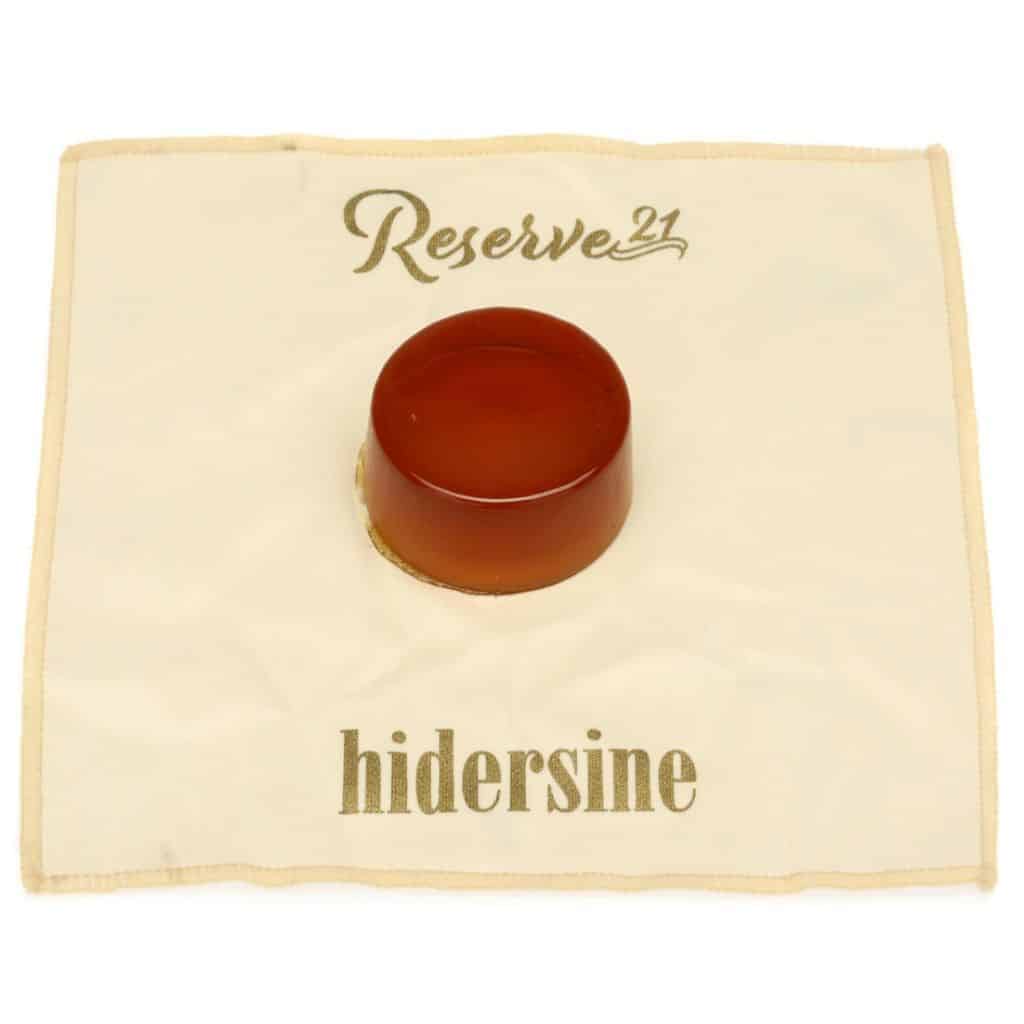
FEATURES: Infused with WW-grade Brazilian resins and British beeswax
OTHER INFO: Crafted using Hidersine's acclaimed hand-mixing and hand-pouring artisanal process
- Provides a low-dust, high-grip playing experience
- Comes with a great-looking microfiber cloth and a handsome velveteen drawstring bag
- No Cons!
When you click ‘Check Price’, you’ll see there are loads of great places to buy this item. Our personal favorite is Sweetwater for the US, and Thomann and Gear4Music for the UK & Europe.
They are the largest music retailers, with excellent customer service, competitive prices, really fast shipping, and the longest guarantees.
The professional musician who wrote this article combined many things,
from the product build, manufacturer’s reputation through to feedback
from other users, to create our famous TedScore™.
Does Violin Rosin Make A Difference?
It Does!
When you pick up your violin to play, it’s not just your skill that shapes the sound. Rosin plays a surprisingly important role in your music-making journey. In fact, you literally can’t play the violin with a bow without rosin!
It’s the sticky companion that your bow can’t do without, as it provides the needed friction to set those strings in motion.
Why is this so? Well, rosin formulations—ranging from hard to soft—can enhance or diminish your violin’s voice.

Hard rosin is terrific in humid climates; it’s less gooey and diligently does the job.
Soft rosin shines in drier air, releasing a lush tone as it grips the strings warmer.
Light rosin dusts off a delicate sound perfect for an intimate venue.
Dark rosin may bring out a rich, full-bodied presence suitable for a grand hall.
Don’t get it twisted—your choice of rosin is no trivial matter. It’s essential, like the bow to your violin.
So next time you’re tuning, tightening, and toe-tapping in preparation for a performance or practice, don’t forget that tiny rosin cake!
But wait! That’s not all!
Now that you know the importance of the rosin, it’s also important to know the best string partner it can dance with. Read this next article to learn about the best strings most violinists love to have!
FAQ's
Yes, the type of rosin matters for violin as different rosins can vary in grip and texture, affecting the sound and tonal qualities of the bow on the strings.
Expensive, higher-quality violin rosin often provides a smoother, more consistent grip. It can produce a clearer, more refined sound, while cheap rosin may be grittier and less durable, potentially affecting the quality of play.
Light rosin is generally harder and less sticky, suitable for warmer climates and producing a lighter, smoother sound. In comparison, dark rosin is softer and stickier, better for cooler climates, and generates a richer, more robust tone.
Playing the violin without rosin can produce a very faint sound as the bow will have little grip on the strings, making it difficult to produce the full range of dynamics and violin tone quality.











